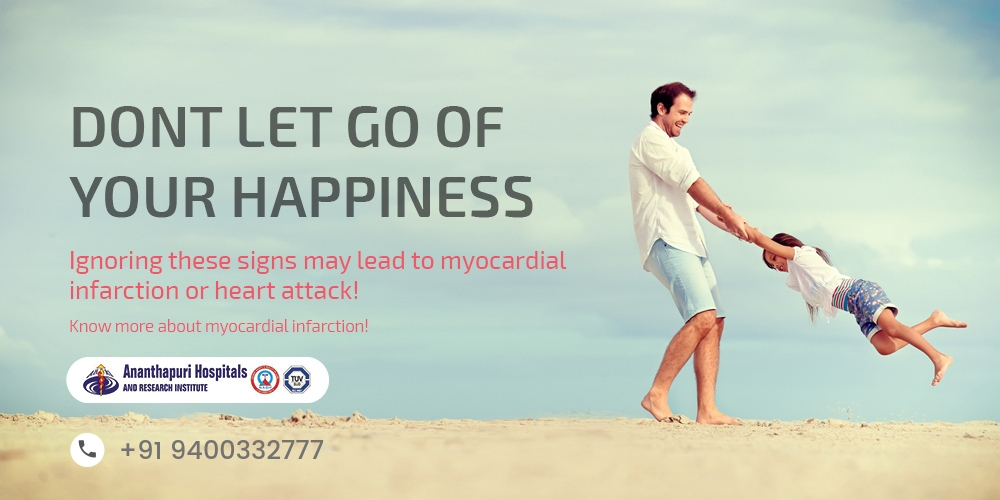- 17/October/2019

Myocardial infarction - Definition, Types - Ananthapuri Hospitals, Trivandrum
A doctor at Ananthapuri Hospitals and Research Institute writes:
“Please bring me the last patient’s ECG report,” I told the nurse. “ Yes doctor”, he responded, looking utterly disturbed. “What is wrong?”, I asked. “Oh, its nothing doctor. It is just a small pain in the chest that comes and goes away. I am alright now”, he replied. “How can you take it so lightly? Don’t you know how dangerous it can get? It might be a symptom of heart disease. There is absolutely no harm in getting checked.”, I recommended.
People cognitively ignore such medical symptoms to avoid things they don’t want to be real. It is a natural defence mechanism. But at what cost?
I am writing an article about myocardial infarction for those who tend to avoid symptoms such as chest pain in your day today life, thinking “It will come and go”. Please read through to learn more.
-
What is myocardial infarction?
"Myo" refers to muscle, "cardial" refers to the heart, and "infarction" refers to the death of tissue due to lack of blood supply. In simple words, what you call a ‘heart attack’ is what doctors refer to as ‘myocardial infarction’.
A myocardial infarction takes place when there is a sudden blockage of an artery that supplies blood to your heart. This sudden blockage decreases the oxygen supply, thereby damaging the heart muscles and triggering a heart attack.
-
What causes myocardial infarction?
Most heart attacks occur as a result of hardening or clogging of the coronary arteries with fatty, calcified plaques over time.
-
What are the warning signs and symptoms of myocardial infarction?
Some of the common warning signs and symptoms that you shouldn't ignore are:
- Squeezing or aching sensation in your chest, arms, neck, jaw or back that recur at irregular intervals
- Discomfort or pain in the middle of the upper abdomen that tends to prevails for more than a few minutes
- Nausea, indigestion and heartburn which may also break into a cold sweat
- Shortness of breath, unusual fatigue and sudden dizziness which are some other common symptoms that are reported by heart patients
-
What are the risk factors of myocardial infarction?
Myocardial infarction is triggered when the arteries get clogged. This clogging is caused by several risk factors including a high level of LDL (bad cholesterol) and blood pressure, diabetes, family history, smoking, obesity, and sedentary lifestyle.
-
What are the types of myocardial infarction?
Based on the degree of blockage, myocardial infarction can be categorised into three types. A doctor understands the degree of blockage by looking at the ST segment, a pattern that appears on an electrocardiogram. The three types of myocardial infarction are:
- ST segment elevation myocardial infarction (STEMI)
A STEMI heart attack is the most severe form of a heart attack which requires immediate medical attention. This occurs when the blood flow to the heart is restricted due to complete blockage of the coronary arteries. It gradually damages the heart muscles, which can eventually lead to death.
- Non ST segment elevation myocardial infarction (NSTEMI)
NSTEMI heart attacks occur when the blood flow to the heart is restricted due to partial blockage of the coronary arteries. Though they are less intense when compared to a STEMI, it can still cause permanent damage to the heart.
- Coronary spasm or unstable angina
Coronary spasms or unstable angina are commonly known as silent heart attacks. They occur when the blood flow to the heart is restricted due to contracted coronary arteries. Though it does not cause any permanent damage to the heart, a coronary artery spasm can increase the risk of having a more severe heart attack.
-------------------------
It is important to eat healthily, exercise regularly and to keep tabs on your blood pressure. Meanwhile, having regular checkups can help you stay on the check.
Ananthapuri Hospitals has an excellent team of cardiologists at your service. To book an appointment, call us at +91 9400332777 or visit our hospital at Chacka, NH Bypass, Thiruvananthapuram.

